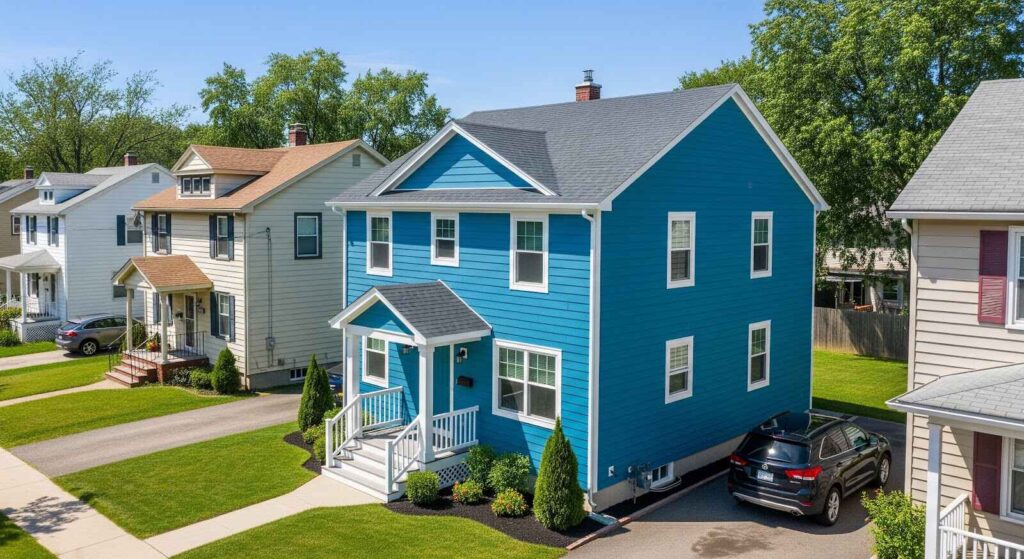Transform your home’s exterior without breaking the bank – discover everything you need to know about painting aluminum siding like a pro
If you’ve been wondering “can you paint aluminum siding?” – you’re not alone. Millions of homeowners face this exact question when their once-bright aluminum siding starts looking chalky, faded, or simply outdated. The good news? Not only can you paint aluminum siding, but when done correctly, it can completely revolutionize your home’s curb appeal and potentially add thousands to its value.
In this comprehensive guide, we’ll walk through everything you need to know about painting aluminum siding, from preparation to paint selection to long-term maintenance. Whether you’re a DIY enthusiast or considering hiring professionals, you’ll have all the knowledge needed to make an informed decision about this transformative home improvement project.
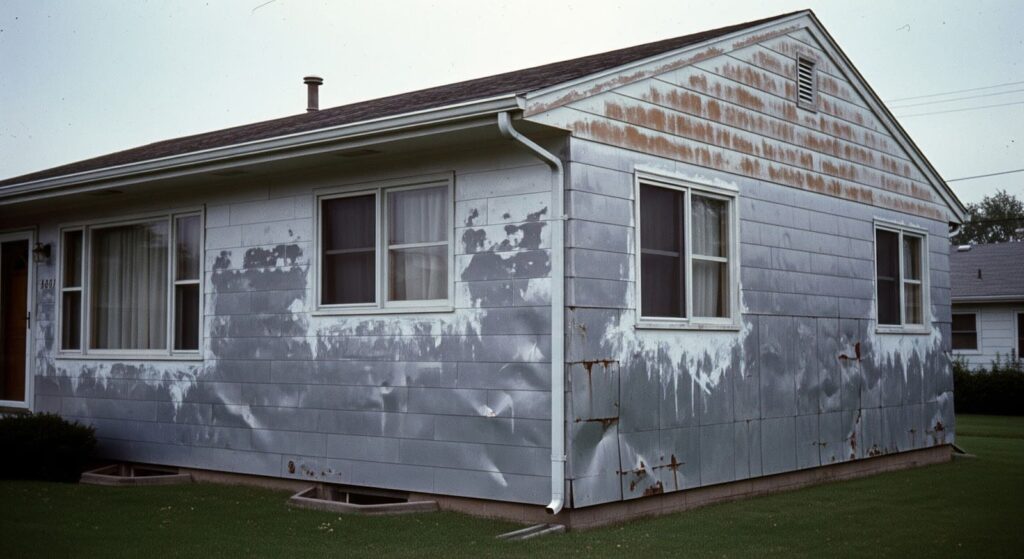
Understanding Aluminum Siding: The Foundation of Success
Before diving into the painting process, it’s crucial to understand what makes aluminum siding unique. Installed primarily between the 1940s and 1980s, aluminum siding was the go-to choice for homeowners seeking low-maintenance, durable exterior protection. However, over time, several challenges emerge:
Common Aluminum Siding Issues:
- Chalking (powdery residue from UV exposure)
- Oxidation and corrosion
- Fading and discoloration
- Dents and minor damage
- Outdated color schemes
The key question many homeowners ask is: should you paint aluminum siding or consider replacement? In most cases, painting is the more cost-effective solution, especially when the siding is structurally sound.
Should You Paint Aluminum Siding? Weighing Your Options
The decision to paint aluminum siding involves several factors that every homeowner should carefully consider:
Benefits of Painting Aluminum Siding:
- Cost savings (60-80% less than replacement)
- Immediate aesthetic improvement
- Extended siding lifespan
- Increased home value
- Customizable color options
- Environmental benefits (reduced waste)
When Painting Makes Sense:
- Siding is structurally intact
- No significant corrosion or damage
- Budget constraints make replacement impractical
- Desire for color change or refresh
When to Consider Replacement Instead: For example, some homeowners may switch to board and batten vinyl siding for a modern, durable alternative.
- Extensive corrosion or damage
- Multiple punctures or large dents
- Insulation upgrade needed
- Siding is nearing end of useful life
Most homeowners find that painting aluminum siding provides excellent returns on investment, particularly when the existing siding is in good condition but simply needs aesthetic refreshing.
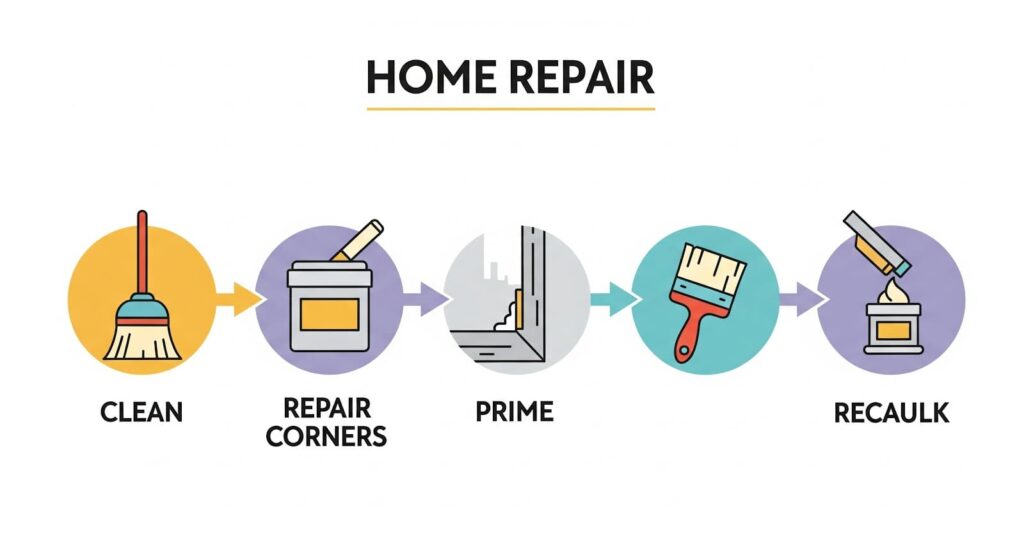
Essential Preparation: The Secret to Long-Lasting Results
Success in painting aluminum siding starts long before you open the first paint can. Proper preparation accounts for roughly 70% of your project’s success and longevity.
Step 1: Thorough Inspection and Cleaning Siding
Begin with a comprehensive inspection of your aluminum siding. Look for loose panels, damaged sections, or areas requiring repair. The cleaning siding process is absolutely critical – aluminum siding accumulates chalk, dirt, mildew, and oxidation over time.
Professional Cleaning Process:
- Power washing: Use low to medium pressure (1,500-2,000 PSI)
- Detergent solution: Mix warm water with mild detergent
- Scrub stubborn areas: Use soft-bristled brushes for tough spots
- Rinse thoroughly: Ensure complete removal of cleaning solutions
- Dry completely: Allow 24-48 hours for full drying
Pro Tip: Never use high-pressure washing on aluminum siding, as it can force water behind the panels and cause moisture problems.
Step 2: Addressing Aluminum Siding Corners and Details
Pay special attention to aluminum siding corners, trim pieces, and architectural details. These areas often accumulate more dirt and may require additional preparation:
- Remove loose caulk from corners and seams
- Sand rough or oxidized areas with fine-grit sandpaper
- Prime any bare metal exposed during preparation
- Recaulk joints with high-quality exterior caulk
Step 3: Priming for Success
Primer selection is crucial when painting aluminum siding. Use a high-quality, adhesion-promoting primer specifically designed for metal surfaces. This step ensures proper paint adhesion and prevents premature failure.
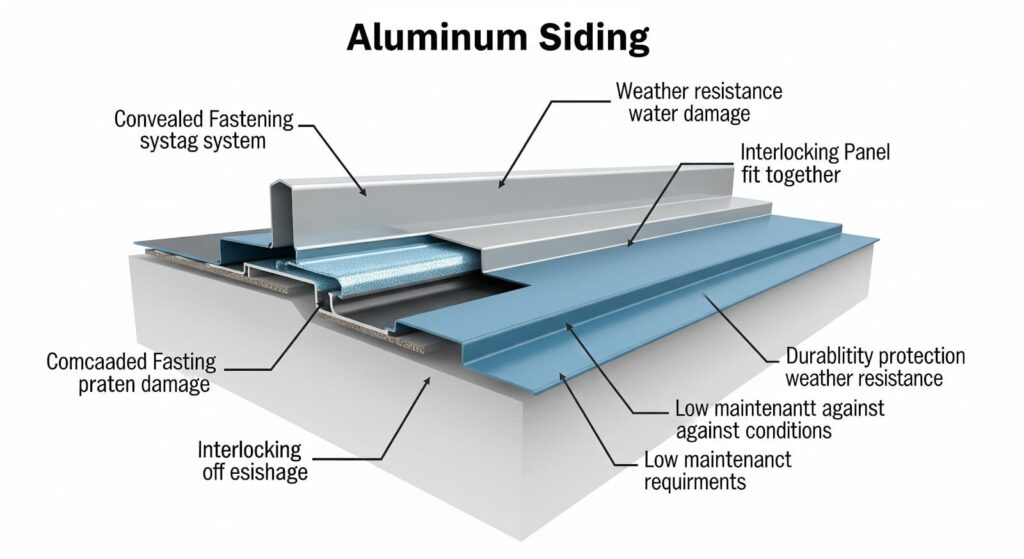
Choosing the Best Paint for Aluminum Siding
Selecting the right aluminum siding paint can make the difference between a paint job that lasts 5 years versus one that looks great for 15+ years. Here’s what you need to know:
Top Paint Types for Aluminum Siding
Acrylic Latex Paint:
- Excellent adhesion to metal
- Superior weather resistance
- Easy cleanup and application
- Flexible finish that moves with temperature changes
100% Acrylic Paint:
- Premium option for maximum durability
- Outstanding color retention
- Excellent resistance to chalking and fading
- Higher initial cost but better long-term value
Alkyd-Modified Acrylic:
- Combines durability of oil-based with easy cleanup of latex
- Excellent flow and leveling properties
- Good for challenging weather conditions
Color Considerations
When selecting colors for your aluminum siding project, consider these factors:
- Light colors: Reflect heat and show less dirt but may appear stark
- Medium tones: Offer good balance of practicality and aesthetics
- Dark colors: Create dramatic appeal but may show scratches more readily
- Neutral palettes: Provide timeless appeal and broad market acceptance, similar to the classic look discussed in our guide on vinyl shake siding vs cedar shake.
Energy Efficiency Note: Lighter colors can reduce cooling costs by reflecting more solar heat, while darker colors may increase energy consumption in warm climates.
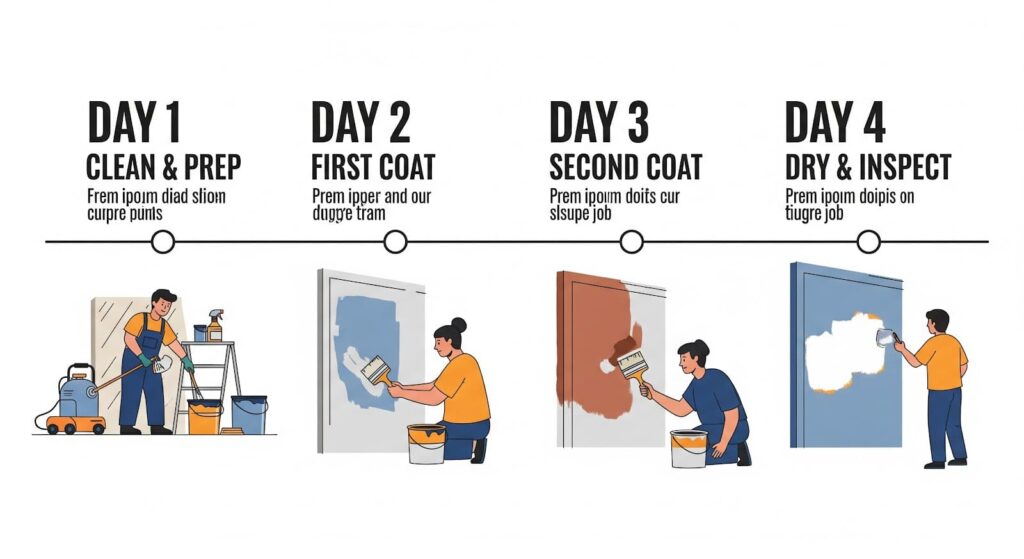
Step-by-Step Painting Process
Now for the main event – the actual painting process. Follow these steps for professional-quality results:
Phase 1: Final Preparation
- Weather check: Choose a period with 3-4 days of dry, mild weather
- Temperature considerations: Paint when temperatures are between 50-85°F
- Protect landscaping: Cover plants and outdoor furniture
- Gather tools: Brushes, rollers, sprayers, drop cloths, ladders
Phase 2: Application Technique
Brush Application:
- Use high-quality synthetic brushes for cut-in work
- Apply paint in thin, even coats
- Work in manageable sections (8-10 feet)
- Maintain wet edges to prevent lap marks
Roller Application:
- Choose medium-nap rollers for textured surfaces
- Work in overlapping “W” patterns
- Back-roll all areas for uniform coverage
Spray Application:
- Ideal for large, unobstructed areas
- Requires extensive masking and protection
- Provides smoothest finish when done correctly
- Consider professional application for best results
Phase 3: Multiple Coat Strategy
Most aluminum siding projects require two coats for optimal coverage and durability:
First Coat:
- Focus on complete, even coverage
- Don’t worry about minor imperfections
- Allow full drying time (typically 4-6 hours)
Second Coat:
- Apply 24 hours after first coat
- Concentrate on achieving uniform appearance
- Take extra care around aluminum siding corners and details

Cost Analysis: DIY vs. Professional Installation
Understanding the financial implications helps homeowners make informed decisions about their aluminum siding painting project.
DIY Cost Breakdown
Materials (1,500 sq ft home):
- Premium primer: $150-200
- High-quality paint: $300-400
- Brushes, rollers, supplies: $100-150
- Equipment rental: $200-300
- Total DIY Cost: $750-1,050
Time Investment:
- Preparation: 2-3 days
- Painting: 3-4 days
- Total project time: 5-7 days
Professional Installation Costs
Professional Service (1,500 sq ft home):
- Labor and materials: $3,500-6,000 (consistent with national averages for the cost to paint a house exterior).
- Premium paint upgrade: $500-800 additional
- Total Professional Cost: $4,000-6,800
Advantages of Professional Service:
- Warranty protection (typically 5-10 years)
- Insurance coverage
- Professional equipment and expertise
- Time savings
- Guaranteed results
Maintenance and Longevity: Protecting Your Investment
A well-executed aluminum siding paint job can last 15-20 years with proper maintenance. Here’s how to maximize your investment:
Annual Maintenance Schedule
Spring Cleaning:
- Gentle washing with mild detergent
- Inspect for any damage or wear
- Touch up minor scratches or chips
- Check caulking around aluminum siding corners
Fall Preparation:
- Remove leaves and debris
- Clean gutters and downspouts
- Inspect paint condition
- Plan any needed touch-ups
Early Problem Detection
Watch for these warning signs that may indicate maintenance needs:
- Chalking or powdery residue
- Color fading in high-exposure areas
- Small chips or scratches
- Caulk failure around seams
- Water staining or discoloration
Addressing these issues promptly prevents more extensive problems and extends your paint job’s lifespan.
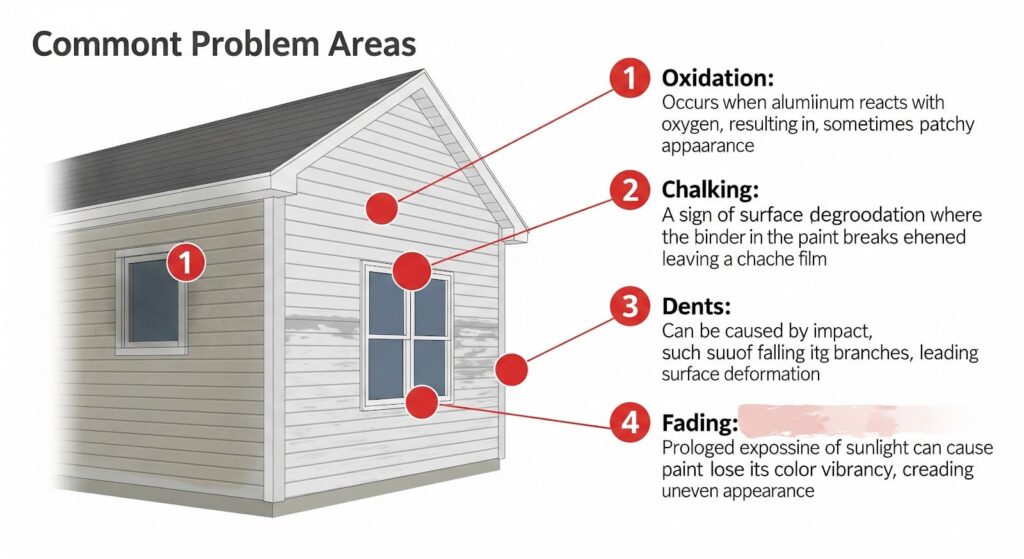
Common Mistakes to Avoid
Learning from others’ mistakes can save you time, money, and frustration:
Preparation Shortcuts:
- Skipping proper cleaning leads to adhesion failure
- Inadequate priming causes premature peeling
- Ignoring weather conditions results in poor curing
Application Errors:
- Applying paint too thickly creates runs and sags
- Working in direct sunlight causes lap marks
- Rushing between coats prevents proper adhesion
Product Selection Issues:
- Using interior paint on exterior surfaces
- Choosing lowest-cost options over quality
- Mismatching primer and paint systems
Environmental and Safety Considerations
Painting aluminum siding responsibly involves several important safety and environmental factors:
Safety Precautions
- Use proper ladder safety techniques
- Wear appropriate protective equipment
- Ensure adequate ventilation when using primers
- Protect skin and eyes from paint splatter
- Follow manufacturer’s safety guidelines and review EPA guidelines on lead paint if your siding was installed before 1978.
Environmental Responsibility
- Dispose of paint and materials properly
- Use low-VOC or zero-VOC paint products when possible
- Protect storm drains during washing and painting
- Consider timing to minimize impact on local wildlife
Troubleshooting Common Issues
Even with careful preparation, challenges can arise. Here’s how to address common problems:
Paint Adhesion Problems:
- Usually caused by inadequate surface preparation
- Solution: Remove failing paint, re-prep surface, and apply proper primer
Uneven Coverage:
- Often results from inconsistent application technique
- Solution: Light sanding and additional coat application
Color Matching Challenges:
- Can occur when touching up older paint
- Solution: Paint entire panels or sections for uniform appearance
Regional Considerations for Different Climates
Your location significantly impacts paint selection and application timing:
Hot, Sunny Climates:
- Choose heat-resistant formulations
- Opt for lighter colors to reduce heat absorption
- Paint during cooler morning or evening hours
Cold, Wet Climates:
- Select paints with superior moisture resistance
- Ensure extended drying time in humid conditions
- Plan projects during dry seasons
Coastal Areas:
- Use paints with enhanced salt-spray resistance
- Increase maintenance frequency due to harsh conditions
- Consider specialized marine-grade coatings
Frequently Asked Questions
Q: How long does painted aluminum siding last?
A: With proper preparation and high-quality paint, aluminum siding can maintain its appearance for 15-20 years. Factors affecting longevity include climate, paint quality, and maintenance practices.
Q: Can you paint over already-painted aluminum siding?
A: Yes, but proper preparation is essential. Remove loose paint, clean thoroughly, and use appropriate primer for the existing paint type.
Q: What’s the best time of year to paint aluminum siding?
A: Late spring through early fall typically offers ideal conditions. Avoid painting in extreme temperatures, high humidity, or when rain is forecast within 24 hours.
Q: Do I need special paint for aluminum siding?
A: While standard exterior latex paint can work, paints specifically formulated for metal surfaces provide superior adhesion and durability.
Q: How much does it cost to paint aluminum siding myself?
A: DIY costs typically range from $0.50-0.70 per square foot for materials, compared to $2.50-4.50 per square foot for professional installation.
Q: Can painting aluminum siding increase home value?
A: Yes, a fresh paint job can increase home value by 2-5% and significantly improve curb appeal, making it an excellent return on investment.
Q: What happens if I don’t prime aluminum siding before painting?
A: Skipping primer can lead to poor adhesion, early paint failure, uneven coverage, and significantly reduced paint job lifespan.
Q: How do I handle aluminum siding corners during painting?
A: Use a high-quality angled brush for precision, ensure proper caulking before painting, and apply thin, even coats to prevent drips and runs.
The Bottom Line: Transform Your Home with Confidence
Painting aluminum siding represents one of the most cost-effective ways to dramatically improve your home’s appearance and value. When you follow proper preparation techniques, select quality materials, and apply paint correctly, you’re investing in a transformation that will enhance your home’s beauty and protection for years to come.
The answer to “can you paint aluminum siding?” is a resounding yes – and with the right approach, you can achieve professional-quality results that rival expensive siding replacement at a fraction of the cost.
Key Takeaways:
- Proper preparation is absolutely critical for success
- Quality materials provide better long-term value
- Professional results are achievable with patience and attention to detail
- Regular maintenance extends paint job lifespan significantly
- The investment pays dividends in curb appeal and home value
Ready to Transform Your Home?
Don’t let faded, chalky aluminum siding hold back your home’s potential any longer. Whether you choose the DIY route or hire professionals, the transformation awaits. Start by assessing your siding’s condition, gathering quotes for materials or services, and planning your project timeline.
Remember, every day you wait is another day your home isn’t reaching its full aesthetic potential. Your neighbors will wonder what your secret is when they see the stunning results of your newly painted aluminum siding.
Take Action Today:
- Inspect your aluminum siding condition
- Research the best paint for aluminum siding options
- Get quotes from local professionals if considering hired help
- Plan your project timeline for optimal weather conditions
- Gather your materials and start your transformation
Your dream home exterior is just one paint job away – and now you have everything you need to make it happen successfully and beautifully.

